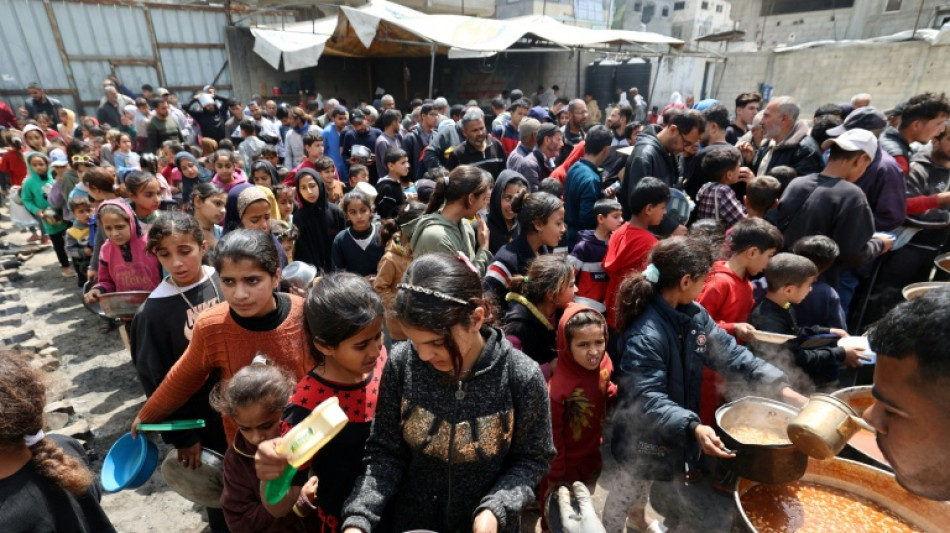
RBGPF
0.1400

The United Nations warned Monday that Gaza was facing its most severe humanitarian crisis since the war began, with no aid entering the territory for weeks and conditions rapidly deteriorating following a ceasefire's collapse.
The UN's alarm came as Palestinian President Mahmud Abbas and French President Emmanuel Macron called for an "urgent" ceasefire in Gaza.
Israel resumed an intense military offensive on Gaza after a ceasefire that came into effect on January 19 collapsed two months later over differences regarding the next phase of the truce.
Hundreds of thousands of people have since been displaced, with Israel blocking the entry of humanitarian aid from March 2, even before the truce disintegrated on March 18.
Medical supplies, fuel, water and other essentials are in short supply, the UN says.
"The humanitarian situation is now likely the worst it has been in the 18 months since the outbreak of hostilities," said the UN Office for the Coordination of Humanitarian Affairs.
In a statement, OCHA said no supplies had reached Gaza for a month and a half.
"Due to the closure of the crossings compounded by restrictions within Gaza, dwindling supplies have forced them (aid workers) to ration and reduce deliveries to make the most of the remaining stocks," OCHA said.
Macron and Abbas urged speedy aid deliveries into the Palestinian territory.
- 'Urgent need' -
In a phone call, they "emphasised the urgent need for a ceasefire, the acceleration of humanitarian aid delivery (and) the rejection of the displacement of the Palestinian people from their land," the official Palestinian news agency Wafa reported.
Macron, following his conversation with Abbas, said on X that "France is fully mobilised for the liberation of all hostages, a return to a durable ceasefire and immediate access for humanitarian aid into Gaza".
He also advocated "reform" of the Palestinian Authority as part of a plan that would see the Ramallah-based body, which currently has partial administrative control in the occupied West Bank, govern a post-war Gaza without Hamas.
"It is essential to set a framework for the day after: disarm and sideline Hamas, define credible governance and reform the Palestinian Authority," Macron said.
Senior Hamas official Taher al-Nunu indicated that the group was willing to release all hostages in exchange for a "serious prisoner swap" and guarantees that Israel would end the war.
"The issue is not the number of captives," Nunu said, "but rather that the occupation is reneging on its commitments, blocking the implementation of the ceasefire agreement and continuing the war".
Speaking after the group held talks with Egyptian and Qatari mediators in Cairo, he said Hamas will not give up its arms.
"The weapons of the resistance are not up for negotiation," Nunu said.
Israeli news website Ynet reported on Monday that, under a new ceasefire proposal that had been put to Hamas, the group would release 10 living hostages in exchange for US guarantees that Israel would enter negotiations for a second phase of the ceasefire.
- France hopes others follow -
Israel had sought to extend the first phase. Hamas insisted that negotiations be held for the second phase under the deal, as outlined by former US president Joe Biden.
Macron announced last week that Paris could recognise a Palestinian state within months, leading to sharp criticisms in Israel.
On Monday he said he hoped French recognition would encourage others to follow, and that countries which do not recognise Israel should also do so.
"What we want to trigger is a series of other recognitions," Macron said in Paris during a visit to an Arab culture centre.
Nearly 150 countries recognise a Palestinian state but France would be the most significant European power to do so.
Israel insists such moves by foreign states are premature.
"President Macron is gravely mistaken in continuing to promote the idea of a Palestinian state in the heart of our land -- a state whose sole aspiration is the destruction of Israel," Netanyahu said in a statement.
The United States has also long resisted recognition of a Palestinian state.
Qatari Emir Sheikh Tamim bin Hamad Al-Thani and Egypt's President Abdel Fattah al-Sisi met Monday in Doha where they supported creating a Palestinian state.
The two leaders "emphasised the centrality of the Palestinian cause as the foremost Arab issue".
T.Kolar--TPP